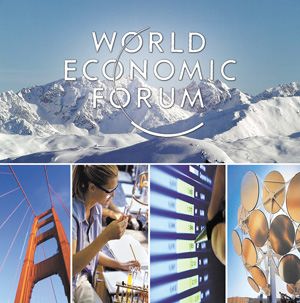An “investment beauty parade”
What arguments is the world business community expecting from Ukraine?
Yesterday the World Economic Forum (WEF) opened its annual meeting in Davos, Switzerland. The theme of this year’s meeting is “Shared Norms for the New Reality.” About 2,500 politicians, businesspeople, and public figures from 100 countries came to discuss the main global economic challenges. It is expected that there will be heads of 35 states among the participants, including French President Nicolas Sarkozy, Russian President Dmitry Medvedev, and German Chancellor Angela Merkel. The Ukrainian delegation is headed by President Viktor Yanukovych. This time the forum is discussing the consequences of the European crisis, the problems of banking regulation, and the danger of a new food crisis and currency wars. “We have to be careful that this [financial] crisis does not become a social crisis, as it has in some countries,” the BBC quotes the Davos forum founder Klaus Schwab as saying. In addition to economic problems, the WEF will also discuss political issues behind the scenes. For example, terrorism and other security issues are high on the agenda, with the attacks in Russia probably shifting the focus away from Afghanistan and Pakistan. And a recently added session will look at “Tunisia — tipping point or Tsunami.”
According to the president’s chief of staff Serhii Liovochkin, Viktor Yanukovych is scheduled to meet leaders of international organizations, such as the EBRD and the UN, as well as leaders of some countries, including the G8.
The head of state of Ukraine, together with Poland’s President Bronislaw Komorowski, will also make a speech at the 7th Ukrainian lunch conference as part of a debate on the two countries’ preparation for the 2012 European Soccer Championship.
The two heads of state will also discuss the development of tourism, the attraction of investments in infrastructural projects, and Ukraine’s global integration in the context of cooperation with Poland. In other words, the Ukrainian team will be projecting at the forum a positive image of this country and persuading foreigners to invest in Ukraine’s development. This is confirmed by the government’s domestic actions.
Ukraine’s Prime Minister Mykola Azarov said yesterday that the government had formed a data base of investment projects until 2014 worth a total 1.1 trillion hryvnias, including 125 strategically important sectoral and regional investment projects and 714 top-priority economic and social pro-jects. “To launch some of these pro-jects, we are going to obtain funds from European, Russian, and other foreign financial organizations and private investors,” Azarov emphasized.
It is commendable that the go-vernment intends to attract considerable funds for developing the Ukrainian economy. But what complicates the search for foreign investments are recent negative assessments of Ukraine’s level of economic and de-mocratic freedoms by the world’s leading organizations. This raises the question of what arguments Ukraine should offer in reply so that Davos forum participants favorably respond to this country’s investment call. Besides, it is important to know what messages the Swiss forum is expecting from Ukraine in order to put the latter on the list of the creators of the new global economic reality.
Oleksandr PASKHAVER, president, Center for Economic Development:
“Ukraine is undeniably getting closer to the developments on the international arena, as our state is an integral part of the global economy. The only question is how active or passive we will be in this process. The forum will consider the investment-related attractiveness of various countries. And the country with the best image will reap the greatest economic benefits. Ukraine’s investment image is, unfortunately, directly opposite to the ideal one. But it is very easy to change it: all the government has to do is really show investors a serious and purposeful movement in the right direction. In other words, the forum investors need very simple messages from Ukraine, such as readiness to be honest towards a partner, an easy-to-grasp procedure of entering and leaving business, rule-of-law rather than secret deals in matters of property, and refusal to resort to informal methods of pressuring business. This is all called ‘investment ABCs,’ which Ukraine knows very well but is not making full use of. Moreover, whenever the government tries to persuade an investor, it should display a positive example of changes and begin with itself in this matter. One more thing: the Davos forum traditionally gathers the most influential businesspeople and economists. So a high-profile participation in it is very important for Ukraine. But this is not what really matters. The Ukrainian government should mull over holding such fora in this country.”
Valerii HEIETS, director, Economic Forecasting Institute of the National Academy of Sciences of Ukraine:
“In 2009-2010, the forum’s investors looked at whether there was macroeconomic stability in the country. Today, their doubts have been dispelled. What has come to the foreground is the question of guaranteed economic freedoms. So the main task of the Ukrainian delegation is to pre-sent a clear plan of actions to tackle these problems in order to appease the investors. It is also extremely important to hold successful negotiations with international financial organizations so that they join various infrastructural projects, for example, under the auspices of the State Fund of Regional Development. It is this kind of message that I think the forum participants must get. If this happens investors will trust Ukraine more. Then the Ukrainian government will have to address domestic problems. In my view, the World Economic Forum is an ‘investment beauty parade’ at which Ukraine must show itself from the best angle. The inflow of foreign capital depends very much on the way they will see and remember us.”






